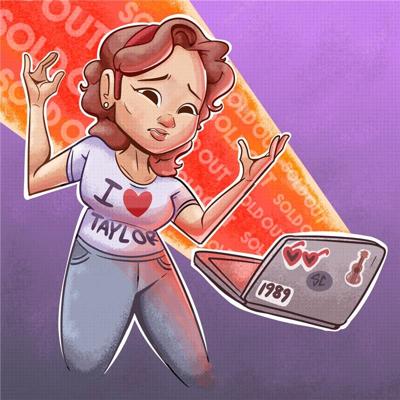
Only in your ”Wildest Dreams” were you getting Taylor Swift tickets this year.
Music icon Taylor Swift and her fans, the Swifties, are infuriated with the process of purchasing tickets for her upcoming tour. After Swift’s latest album, "Midnights" was released, fans were aching for a tour. Once Swift announced her Eras Tour, the ticket demand was high, but fans weren’t prepared to be attacking each other like bears for them.
According to Live Nation’s Ticketmaster, more than two million tickets for her upcoming tour were sold on Nov. 15, making it the highest number of tickets sold for an artist in only one day. Selling out a tour may sound great, but this was only the pre-sale tickets for “Verified Fans.” On Nov. 17, Ticketmaster ended up canceling the upcoming ticket sales for the general public.
According to Live Nation Chairman Greg Maffei in a CNBC interview on Thursday, Nov. 17, 14 million users — including bots — waited in the queue to get tickets.
While Maffei expressed sympathy for fans who were unable to obtain tickets, he explained that the difficulties were “a function of the massive demand Taylor Swift has.”
Ticketmaster has installed an extra step for users called the "Verified Fan" experience for specific high-demand concerts. This was added in order to tackle scalpers and bots from scooping up tickets. Selected fans would receive a specific code from Ticketmaster, granting them access to an early ticket-buying period. The process behind Ticketmaster's "Verified Fan" program is a bit of a mystery. The program is intended to keep out bots and scalpers, but many genuine fans have voiced concerns about not receiving codes or tickets.
Just registering to become a “Verified Fan” doesn’t guarantee you a pre-sale code. If the demand for tickets is high enough, people are waitlisted.
Here are the big questions: How were there 14 million “Verified Fans?” Is this just a way for Ticketmaster to pocket more money?
Ticketmaster should have been better organized by having a limited number of “Verified Fans” chosen so other people have a chance of purchasing tickets through the general release.
On top of the agonizing wait to get access to select tickets, fans around the U.S. reported being kicked out of the queue, having their payments declined and a slew of other maddening website technical issues.
Senior political science and economics double major Fiona Jordan was one of the lucky fans who were able to get tickets, but it wasn’t an easy process. “I woke up at 6 a.m. to join the waiting room since tickets went on sale at 7 a.m.,” she said. “At 7 a.m., [Ticketmaster] immediately sent everyone from the waiting room into the queue.”
Jordan wasn’t too worried about getting tickets at first because the queue was moving pretty quickly at the time. “After about 30 minutes, [myself and fans on the internet] realized the queue stopped moving, and Ticketmaster had crashed. I was determined to get these tickets, so I waited three hours, staring at my screen.”
Luckily, Jordan was able to get tickets for the show she wanted but feels terrible for all the fans who weren’t able to purchase tickets.
Swift quickly responded to the issue on her Instagram story: “It’s really difficult for me to trust an outside entity with these relationships and loyalties, and excruciating for me to just watch mistakes happen with no recourse,” she stated. “There are a multitude of reasons why people had such a hard time trying to get tickets and I’m trying to figure out how this situation can be improved moving forward. I’m not going to make excuses for anyone because we asked them multiple times if they could handle this kind of demand and we were assured they could.”
I don’t understand the point of having a pre-sale if all the tickets were going to sell out before the general ticket sale. This is a problem that Ticketmaster has created, and honestly, I don’t think this whole debacle was an accident because they are just trying to profit off of sales. Ticketmaster doesn’t care who is giving them money — they just want it.
According to the New York Times, the Department of Justice will launch an antitrust investigation into Ticketmaster's parent company.
While antitrust concerns were voiced by many in 2010 during the merger of Live Nation and Ticketmaster, they were mostly overlooked, and both companies were allowed to merge later that year.
“The Live Nation and Ticketmaster merger has really screwed people over, and Taylor Swift isn’t the first time,” stated Jordan. “It symbolizes the corruption within monopolies and how damaging it is to the consumer.”
Unfortunately for fans, this ticketing monopoly is anti-competitive — if it wasn't, it could have resulted in the formation of stronger rivals, lowered ticket prices and improved the efficiency of ticketing systems. Ticketmaster doesn't want a fair market; they want to make money off of every ticket sold, whether it's to a fan or a bot.
Eric Budish, an economics and entrepreneurship professor at the University of Chicago, told the Washington Post that both Swift and Ticketmaster planned to use a dynamic pricing system during the ticket sales.
Dynamic pricing is a new pricing system used by Ticketmaster that determines ticket prices based on demand — the longer people wait in line for tickets, the more expensive they become.
“What really makes me mad is the thought of people buying tickets with the sole intention of reselling them for significant money,” explained Jordan.
Is this “Verified Fan” thing even real?
Some of these not-so “Verified Fans” that were able to get tickets were scalpers and bots, who are now selling tickets for up to $28,000.
The monopoly of Ticketmaster has to be dismantled, and the "Verified Fan" system needs to be reformed. Fans deserve to see their favorite artist in concert without having to pay an absurd amount of money and without the stress of competing with 14 million people. Artists, such as Swift, need to find the best solution to limit the amount of early-access users and “Verified Fans.” If the number of “Verified Fans” were limited, even just to people in Taylor Swift's fan club (which should also be limited), then this mess would’ve been less likely to happen.
While Swift did not offer any solid plans to add more dates to her upcoming tour or to invite more fans to the current stops, she did directly address "those who didn't get tickets."
“All I can say is that my hope is to provide more opportunities for us to all get-together and sing these songs," she concluded. "Thank you for wanting to be there. You have no idea how much that means."
This is the opinion of Jessica Mingalone, a senior journalism major from Upper Saddle River, N.J. Email comments to editor@theloyolan.com. Follow and tweet comments to @LALoyolan on Twitter, and like the Loyolan on Facebook.








(0) comments
Welcome to the discussion.
Log In
Keep it Clean. Please avoid obscene, vulgar, lewd, racist or sexually-oriented language.
PLEASE TURN OFF YOUR CAPS LOCK.
Don't Threaten. Threats of harming another person will not be tolerated.
Be Truthful. Don't knowingly lie about anyone or anything.
Be Nice. No racism, sexism or any sort of -ism that is degrading to another person.
Be Proactive. Use the 'Report' link on each comment to let us know of abusive posts.
Share with Us. We'd love to hear eyewitness accounts, the history behind an article.